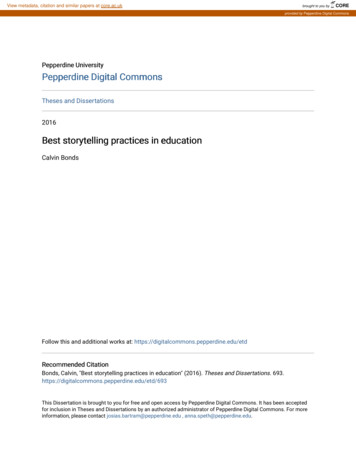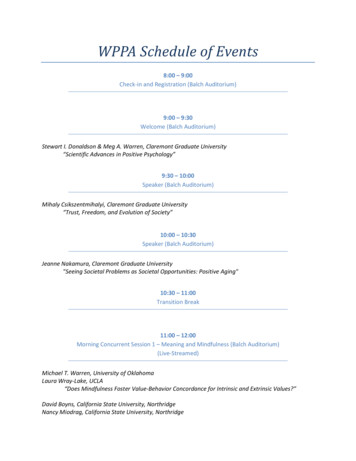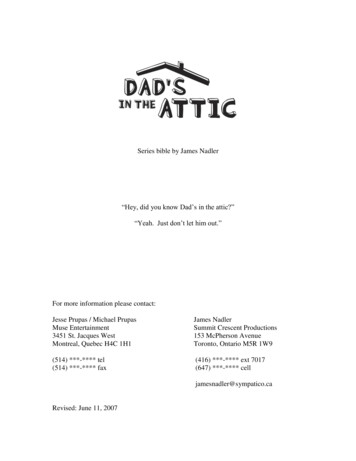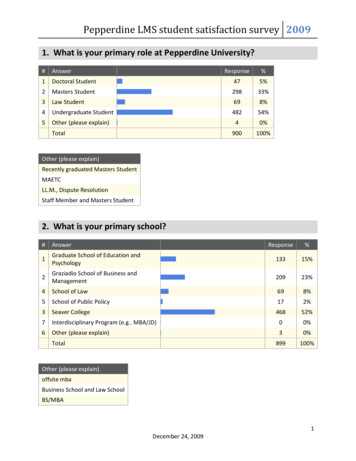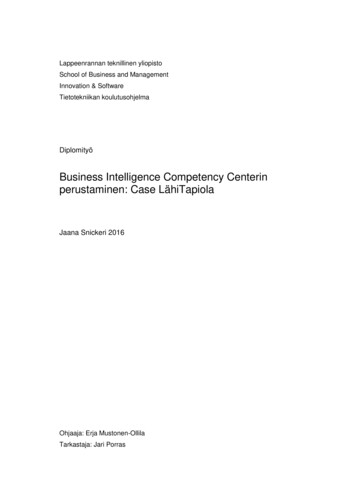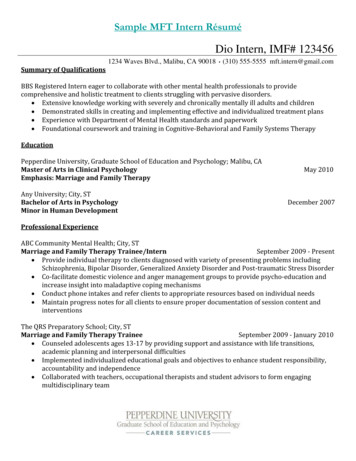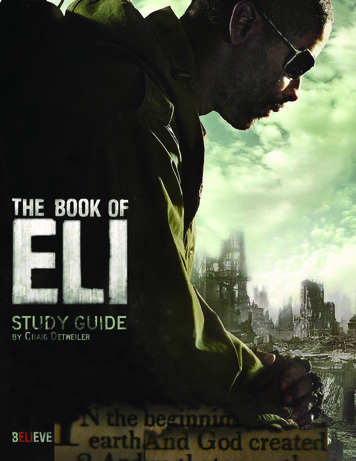
Transcription
THE BOOK OF ELIA Study Guide by Craig DetweilerCenter for Entertainment, Media and CulturePepperdine Universityhttp://www.pepperdine.edu/emcHow far are we willing to go in response to God’s call?What kinds of sacrifices would we make to defend theword of God? And how can we develop a greater appreciation for the gifts God has given us? This studyguide offers a way to connect a riveting new moviewith the timeless truths of Scripture.The Book of Eli begins with a barren landscape. Onedetermined man (Denzel Washington) walks across apost-apocalyptic wasteland. He is a man on a mission, protecting the last Bible on earth. Eli reads andrecites from the Book every day.Unfortunately, Eli is caught between competingforces. A few survivors struggle to rebuild society.Others rob and steal from innocent people. Will orderemerge? Or will raw power prevail? What mightform the foundation of a new civilization?Denzel Washington stars as Eli, a righteous warrior,uncompromising in his commitment to truth, justice,and mercy. But will his narrow path be diverted bytemptations along the way? What about those whoseek to hoard knowledge, to hijack God’s Word fortheir own selfish purposes? Eli reluctantly takes uparms to guard the precious Bible.How do we protect and preserve the most precious things in life—our families, our food, our freedoms? Eli doesn’t want trouble. Unfortunately, hemust resist Carnegie (Gary Oldman) and his bandof marauders. Carnegie rules a frontier town viathreats and intimidation. He controls the local watersupply. Claudia (Jennifer Beals) and her daughterSolara (Mila Kunis) try to live peacefully, but they areout-numbered by outlaws--until Eli arrives. He offersnew-found hope.Eli is wiser than those born after the nuclear annihilation. He can read. And he offers thanks for the giftof life. Solara is drawn to Eli, intrigued by what hereads, how he dines, the poetic knowledge that poursforth from his mouth. How does Eli resist temptationand refuse to buckle under Carnegie’s threats? Whatis the source of his almost supernatural power?The Book of Eli provides thrilling action scenes withdeep philosophical reflections. The movie earns its Rrating through swift and graphic violence. Yet, it alsoupholds the Bible as the font of wisdom and truth. Itdemonstrates how some might twist and distort thatsame Bible for personal profit.As Eli, Denzel Washington embodies a different kindof hero, driven by divine calling. Directors Albert andAllen Hughes have created a distinctive look for TheBook of Eli. The stirring script by Gary Whitta combines elements from classic westerns and sci-fi insurprising ways. The Book of Eli is thrilling and deep.
WHAT MATTERS MOSTOPENIf a fire swept through your neighborhood and you hadonly minutes to leave your house or apartment, whatwould you grab? Of course, you would protect yourfamily. Secure your pets. But what things would youtry to take? What possessions are most precious toyou?Imagine a bleak future. What would be the mostvaluable commodities following a nuclear holocaust?The basic necessities rise in prominence—food, shelter, and clothing. Eli navigates that kind of scarcelandscape, struggling to survive. Where would youturn for ongoing inspiration and encouragement? Ifour economic system collapsed, how would we reassign values to things? What matters the most?READ: Romans 12:17-2117Recompense to no man evil for evil. Provide things honest inthe sight of all men.18If it be possible, as much as lieth in you, live peaceably withall men.19Dearly beloved, avenge not yourselves, but rather give placeunto wrath: for it is written, Vengeance is mine; I will repay,saith the Lord.20Therefore if thine enemy hunger, feed him; if he thirst, givehim drink: for in so doing thou shalt heap coals of fire on hishead.21Be not overcome of evil, but overcome evil with good.Jesus upset the economic system of his day. Heupheld the notion of sharing with those in need,
responding to their requests with gracious gifts. Tothose who lacked clothes, he offered his cloak. Tohis enemies, he offered another cheek. He questioned our investments, suggesting an alternative wayto secure a future:It is far too easy to get inflated or puffed up. Youngmen can start to feel cocky or even indestructible.Athletes may feel they can accomplish anything. Butas we’ve seen, one major mistake can unravel a life—via injury, hardship, or catastrophe.READ: Matthew 6:19-2119Lay not up for yourselves treasures upon earth, where mothand rust doth corrupt, and where thieves break through andsteal:20But lay up for yourselves treasures in heaven, where neithermoth nor rust doth corrupt, and where thieves do not breakthrough nor steal:21For where your treasure is, there will your heart be also.What kinds of trials are you facing? We may discover how much we don’t know about our job, aboutparenting, about balancing a bank account. God maysend people or challenges our way that overwhelmus. We can respond to humbling situations by pausing, reflecting, and repenting. Or we can double downon self-reliance. The Book of Eli suggests that suchself-confidence is not always wise. Particularly whena powerful man of God like Eli is involved. JudgmentAPPLY:What are your most precious possessions? Whatkind of treasures have you stored up? How can youinvest in your eternal future?DUSTED AND BUSTEDOPENHave you ever been overwhelmed? Suffered acrushing defeat? Perhaps you got dusted in a raceor busted on the court. How did you respond to ahumbling situation? Our character is often revealedamidst adversity.and humility may follow.WATCH:Eli prepares for a bar fightIn The Book of Eli, a tavern serves as the social hub,dominated by Carnegie and his henchmen. They areon a mission to find (and destroy) as many books aspossible. Carnegie aims to consolidate his powerby wiping out knowledge. Ignorant people are mucheasier to rule. They will not think to fight for theirrights or to rise up against their oppressors.The Bible is a subversive book. It causes people toquestion injustice. It suggests that God sides with the
poor, the downtrodden, and the outcast. The Word ofGod upsets the social strata, freeing people to live upto their potential. And to take on those who exploitothers.When Eli is pushed, he shoves back. He quotesscripture to those who have seemingly no moralcompass. While they relish the opportunity to fight,Eli delivers a word of warning. He draws upon God’sstrong condemnation is Genesis 3. The same angerthat God exhibited toward Adam and Eve will be unleashed on those who still refuse to acknowledge thesovereignty of God or the sacredness of each other.To a frontier town, Eli corrects their sense of frontierjustice. Eli takes off his gloves. And delivers a biblical body blow.READ: Genesis 3:17-1917To Adam he said, “Because you listened to your wife andate from the tree about which I commanded you, ‘You must noteat of it,’“Cursed is the ground because of you;through painful toil you will eat of itall the days of your life.18It will produce thorns and thistles for you,and you will eat the plants of the field.19By the sweat of your browyou will eat your fooduntil you return to the ground,since from it you were taken;for dust you areand to dust you will return.”Eli levels the field of combat by reminding his enemieshow fragile and fleeting life can be. For those whofeel indestructible or incorruptible, Eli offers a clearcorrective. Our time on earth is fleeting. And ourdeeds (since the time of Adam) have been judged. Itis tough to walk through this life. Work is draining.Toil takes a toll. We must remember our modestroots, living humbly before God, lest we pour judgment upon ourselves.How to retain perspective? The Apostle Paul offersan effective attitude adjustment.READ: Romans 12:3For by the grace given me I say to every one of you:Do not think of yourself more highly than you ought,but rather think of yourself with sober judgment, inaccordance with the measure of faith God has givenyou.APPLY:When have you thought more highly of yourself thanyou ought? In what ways have you been humbled—reduced to dust? What arrogance might need tobe renounced? What do we need to let go of beforeGod can redeem it?
ATTITUDE OF GRATITUDEOPENIs it easier to be grateful in times of blessing or periods of struggle? America lived large for so manyyears. We were blessed with “bling”—all kinds ofways to flaunt our new-found wealth. But now, duringan economic downturn, comes the real test of character (and our wallet). Are we more thankful now, thanwe were then?In a culture of plenty, we may not appreciate the giftsthat God has given us. But when we have little in ourpossession, we notice each bit of divine provision.Having survived a nuclear holocaust, Eli is gratefulfor the gift of life. Even amidst trying circumstances,(like being imprisoned in a shady town!), Eli pauses toexpress his attitude of gratitude.WATCH: Eli introduces Solarato the power of prayer—thesimple act of saying grace.Solara is intrigued by Eli’s surprising values system.Why does he reject the opportunity to exploit her? Ina world where everything has a price, Eli holds him-self (and Solara) to a higher standard beyond bartering. She wonders, “What was it like?” What waslife like before the nuclear meltdown? Eli recalls,“People had more than they needed.” It was a timeand culture of abundance. Unfortunately, Eli adds,“We had no idea what was precious.”How do we understand the word, “precious”? Whatdo we need to grasp God’s values? Note out howGod uses the word “precious” to bless Joseph.READ: Deuteronomy 33:13-1613And of Joseph he said, Blessed of the Lord be his land, forthe precious things of heaven, for the dew, and for the deepthat coucheth beneath,14And for the precious fruits brought forth by the sun, and forthe precious things put forth by the moon,15And for the chief things of the ancient mountains, and forthe precious things of the lasting hills,16And for the precious things of the earth and fulness thereof,and for the good will of him that dwelt in the bush, let theblessings come upon the head of Joseph, and upon the top ofthe head of him that was separated from his brethren.God reminded his people where their blessings camefrom. There are “precious things of heaven.” Wecan see such beauty in the gift of fruit. What color,what variety, what splendor! What about all the precious things of the earth like the beauty of nature andthe power of the mountains? God initially trained hispeople to pause and reflect, to remember where their
provisions came from. Now, we are often so removed from the land, from the harvest, from fruits andvegetables that we forget how amazing such tastyvarieties can be.It took a catastrophe to slow down the survivors inThe Book of Eli. Yet, one leader shows them how topause and pray. He passes on that precious gift tothe next generation. Thanks to Eli, Solara learns totake her time, to dine as an act of divine respect, asan extension of community.APPLY:Do we share God’s perspective on what’s precious?Are we grateful for each day, thankful for our dailybread? Can we pray the Lord’s Prayer with honestyand sincerity?Close by reading and reciting the Lord’s Prayer, Matthew 6:9-13:Our Father which art in heaven, Hallowed be thy name.Thy kingdom come, Thy will be done in earth, as it is inheaven.11Give us this day our daily bread.12And forgive us our debts, as we forgive our debtors.13And lead us not into temptation, but deliver us from evil: Forthine is the kingdom, and the power, and the glory, forever.Amen.910Craig Detweiler, Ph.D. is Associate Professor of Communication and director of the Center for Entertainment, Media andCulture at Pepperdine University in Malibu, California. Hislatest book is Into the Dark: Seeing the Sacred in the TopFilms of the 21st Century.
guide offers a way to connect a riveting new movie with the timeless truths of Scripture. The Book of Eli begins with a barren landscape. One determined man (Denzel Washington) walks across a post-apocalyptic wasteland. He is a man on a mis-sion, protecting the last Bible on earth. Eli reads and recites from the Book every day.


